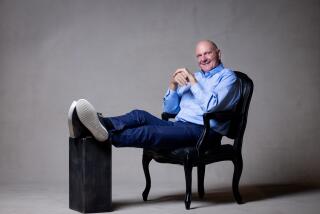Baylor goes on offensive
- Share via
The last line of questioning may have been the toughest for Elgin Baylor during his news conference Thursday morning at his attorney’s office in Beverly Hills.
What have you been doing since October, Elgin? Have you been watching Clippers games? Do you cheer for the team? Is it tough to cheer for the team?
Baylor, 74, the NBA Hall of Famer and former Clippers executive, didn’t answer and appeared more emotional than at any time during the session. His wife, Elaine, grim-faced, was seated to his right and put her hand on his knee under the conference table.
Attorney Alvin Pittman was on Baylor’s other side and put a hand on his shoulder and answered the question, saying, “He’s trying to find himself.”
That may have been the most accurate statement uttered in what has been a tumultuous two days, as the split between the Clippers and Baylor officially entered the legal realm, accompanied by explosive accusations of racism. On Wednesday, Baylor alleged in a civil lawsuit that Clippers owner Donald Sterling has embraced a “vision of a Southern plantation-type structure” for his organization.
Why was this the first time Baylor raised these concerns, given that he worked for the Clippers for 22 years? He is seeking damages of an unspecified amount from the Clippers, Sterling, team President Andy Roeser and the NBA.
“Look at the industry in which he was employed,” said Pittman. “He was employed in an industry that had a dearth of African Americans in executive roles. Sometimes, and we have a rich history of it, of accepting victimization for a bigger cause.
“He endured the indignities and acts of discrimination thrown his way. . . . It doesn’t suggest he liked it. He had a cause bigger than even he and so he toughed it out.”
The Clippers’ legal team framed Baylor’s news conference as an exercise “driven by publicity-seeking attorneys hoping to draw attention to themselves,” according to a statement from the team’s general counsel Robert H. Platt.
“Their false claims carry no weight and have no credibility. Elgin Baylor was with the Clippers for 22 years and he received numerous salary increases and was always treated well,” Platt said.
He added that Baylor turned down an offer to stay with the franchise as a paid consultant or could have remained in the same position. Platt took aim at the Clippers’ record under Baylor:
“During Elgin’s tenure, the other NBA teams employed over 125 general managers with an average tenure of less than five years. In fact, despite the team’s poor draft history and record, Elgin was the NBA’s longest-serving general manager when he chose to resign.”
An NBA spokesperson said Thursday the league does not comment on pending litigation.
The league was not involved in any of the negotiations between Baylor and the Clippers before the lawsuit was filed, according to Baylor’s attorney Carl Douglas, who added the NBA has been aware of the allegations since September and has not responded.
Baylor, for his part, said he was unable to do his job as vice president of basketball operations and general manager, saying he was given limited authority.
“It was like working with one hand behind my back,” he said, adding that he felt an obligation to continue because there was a shortage of African Americans in executive positions in the NBA.
“It was very difficult to get players to come to the Clippers,” Baylor said. “Also difficult getting top coaches. We did get Larry Brown here for a while but Larry left. Coaches just didn’t want to come here with the Clippers. They didn’t want to work for the owner.
“It was as simple as that. I was told flat out. . . . They [players and coaches] would come here if they couldn’t get a better deal anywhere else.”
Baylor’s legal team addressed other discrimination lawsuits involving Sterling and his real estate businesses.
One suit was filed in 2003 by the nonprofit Housing Rights Center and was settled with the terms remaining confidential. According to that suit, Sterling allegedly told members of his staff he did not like to rent to Latinos or African Americans.
The other is a discrimination suit filed by the Justice Department in 2006, alleging that Sterling favored Korean tenants and sought to exclude African Americans and families with children from renting in his apartment buildings. That case has a trial date set for 2010.
“I think it very interesting that this owner has had a history of questionable conduct in both his other business ventures,” Douglas said. “It lends credence and support to many of the allegations we are making in the lawsuit.”
--
More to Read
Get our high school sports newsletter
Prep Rally is devoted to the SoCal high school sports experience, bringing you scores, stories and a behind-the-scenes look at what makes prep sports so popular.
You may occasionally receive promotional content from the Los Angeles Times.








